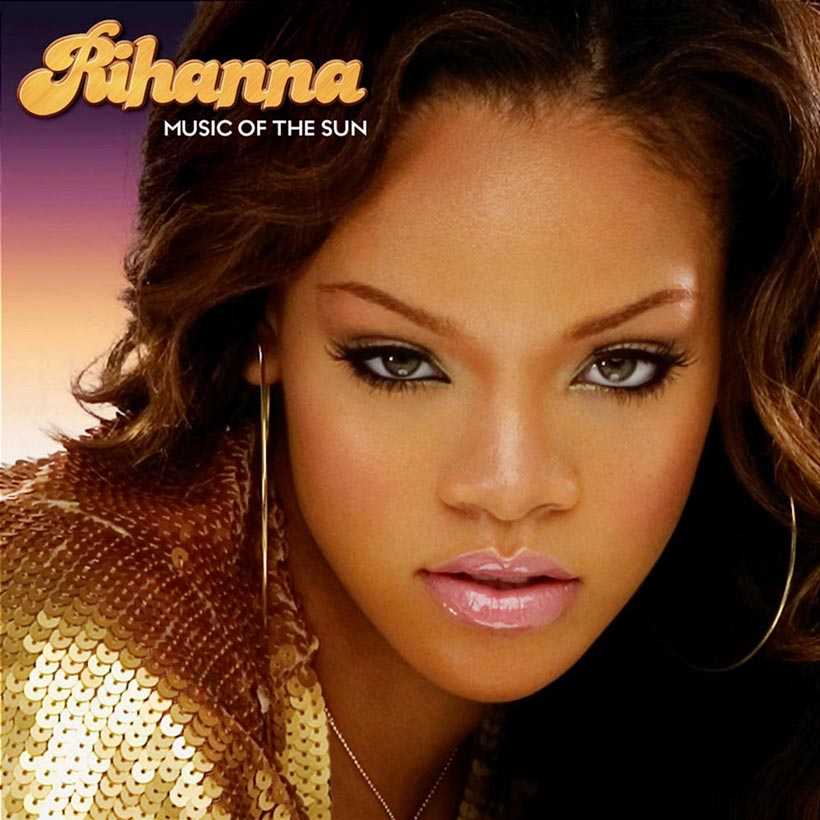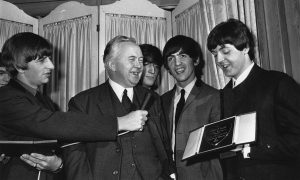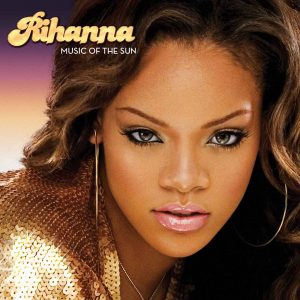From her 2007 breakthrough, Good Girl Gone Bad, to her 2016 opus, Anti, most of the critical conversations surrounding Rihanna’s discography have overlooked her auspicious debut album, Music Of The Sun. Much of this oversight can be attributed to how the Bajan singer’s discography grew expansively over the years, the result of constant experimentation and risk-taking when she could just as easily have sat back and rested on her laurels – or royalties.
Rihanna’s origin story is well-documented: a 17-year-old aspiring singer catches the ear of Def Jam’s then-President/CEO, Jay Z, auditions for him, and is offered a recording contract hours later. But it would take more than just one single to distinguish herself from the Ciaras and Ameries of the day.
Buy Rihanna’s music on vinyl now.
‘Won’t you turn the music up?’
As her debut single – and Music Of The Sun album opener – “Pon De Replay” promised, Rihanna would have an explosive impact on dancefloors worldwide. Accompanied by a running dancehall riddim, the budding songstress raps, “Come, Mr. DJ, song pon de replay/Come, Mr. DJ, won’t you turn the music up.” At that moment, Rihanna not only became a chart success, hitting No.2 on the Billboard Hot 100, but a trendsetter, helping to fuel the 00s’ dancehall revival that included Sean Paul, Lady Saw, and Beenie Man.
Released on August 29, 2005, Music Of The Sun placed a young Rihanna at the forefront of West Indies music and culture. Her follow-up single, “If It’s Lovin’ That You Want,” took a simple midtempo R&B track and added a soca spin courtesy of the 1988 fusion track “Wee Rule,” by UK hip-hop outfit Wee Papa Girl Rappers. Backed by the flare of steel drums, “If It’s Lovin’ That You Want” was evidence that Rihanna was more than just a one-hit-wonder.
Music Of The Sun seamlessly fused native sounds from Barbados and the rest of the Caribbean and featured influential artists from the region. “Rush” capitalized on the fast-paced energy of “Pon De Replay,” with Canada’s original “hip-hop ambassador,” Kardinall Offishall, who jumps on a verse.
“Here I Go Again” features frequent collaborator J-Status and plays into the midtempo vibes of classic reggae, with Rihanna delivering her first “oh na na” on record, predating her 2010 hit, “What’s My Name?” Meanwhile, legendary dancehall rapper Vybz Kartel inserts his ragga style over a cover of Dawn Penn’s “You Don’t Love Me (No, No, No),” while Elephant Man plays the hype man on the official remix of “Pon De Replay.”
More than a reggae record
Amid the heavy Caribbean influences, Music Of The Sun is much more than a reggae record. As Def Jam’s hottest signee, and Jay-Z’s protégé, it’s only natural that Rihanna’s debut album incorporated elements of hip-hop and R&B.
“If It’s Lovin’ That You Want” interpolates the “di di-di, dida di-day” vocal motif from Boogie Down Productions’ historic 1987 diss song “The Bridge Is Over,” while “Willing To Wait” thematically takes its cue from Janet Jackson’s “Let’s Wait Awhile,” as Rihanna sings “Baby slow down” over a sample of “Free” by Deniece Williams. Towards the end of Music Of The Sun, she slows down the pace even more with the soulful ballad “Now I Know.”
Outside of the singles, Music Of The Sun also features two deep cuts that embrace a 90s hip-hop soul sound. On “That La, La, La,” she confronts another woman’s flirtatious behavior towards her man. Produced by Full Force (the trio responsible for Lisa Lisa And Cult Jam’s 1985 smash “Can You Feel The Beat”) “That La, La, La” adds a dub reggae flavor to an otherwise cranked-out cheerleader chant.
Meanwhile, “There’s A Thug In My Life” hints at the potential bad boys Rihanna would sing of in later songs. After going against her mother’s wishes (and her own intuition, knowing that “It’s gonna cause crazy trouble”), the singer abandons the philosophy she laid out in “Willing To Wait,” over the heavily-sampled ‘A Dream’ by DeBarge.
Global influences
Rihanna became the international icon she is today, in part thanks to her ability to implement musical styles from across the globe. Though reggae and R&B are the backbone of Music Of The Sun, there are moments where she borrows elements from other regional styles. On the seductive “Let Me,” she blends her native upbeat soca with hypnotic Middle Eastern-inspired flutes, while “The Last Time” has elements of a Latin-pop ballad, as Rihanna croons over classical guitar lines.
At the heart of the album is its title track, which utilizes another DeBarge staple, “Rhythm Of The Night,” and was co-written by legendary songwriter Diane Warren. Over a reggae melody, Rihanna tips her hat to the West Indian culture that’s shaped her, suggesting we can all “dance to the music of the sun.”
Upon its release, Music Of The Sun reached No.10 on the Billboard 200 and quickly went gold, while her runway single, “Pon De Replay,” seemed incapable of stopping. For the Caribbean queen in the making, however, this was just the beginning.
Buy Rihanna’s music on vinyl now.




